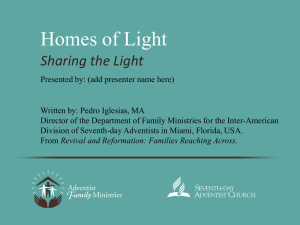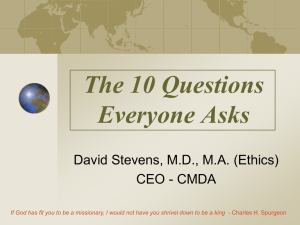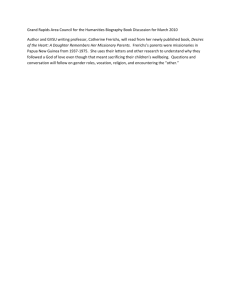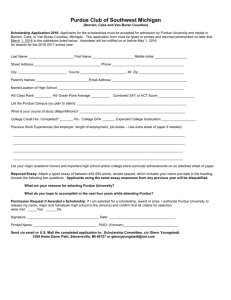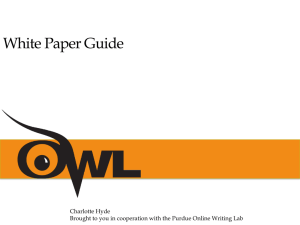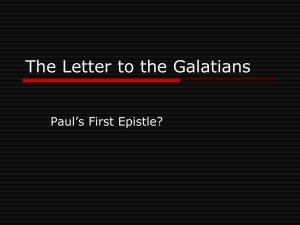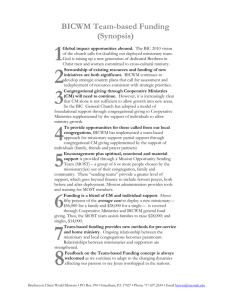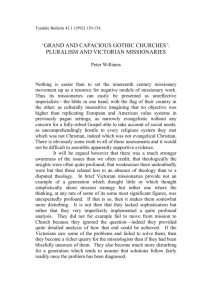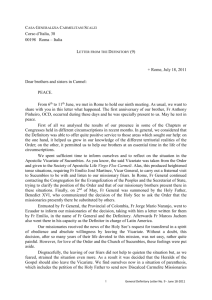Syllabus - College of Liberal Arts
advertisement
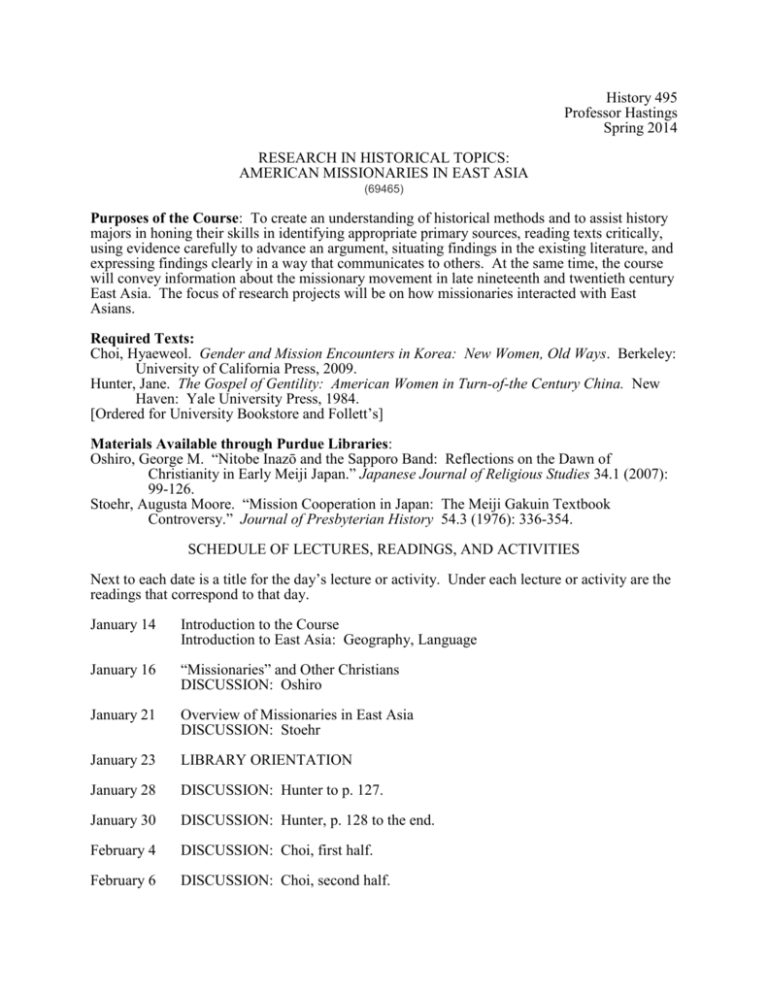
History 495 Professor Hastings Spring 2014 RESEARCH IN HISTORICAL TOPICS: AMERICAN MISSIONARIES IN EAST ASIA (69465) Purposes of the Course: To create an understanding of historical methods and to assist history majors in honing their skills in identifying appropriate primary sources, reading texts critically, using evidence carefully to advance an argument, situating findings in the existing literature, and expressing findings clearly in a way that communicates to others. At the same time, the course will convey information about the missionary movement in late nineteenth and twentieth century East Asia. The focus of research projects will be on how missionaries interacted with East Asians. Required Texts: Choi, Hyaeweol. Gender and Mission Encounters in Korea: New Women, Old Ways. Berkeley: University of California Press, 2009. Hunter, Jane. The Gospel of Gentility: American Women in Turn-of-the Century China. New Haven: Yale University Press, 1984. [Ordered for University Bookstore and Follett’s] Materials Available through Purdue Libraries: Oshiro, George M. “Nitobe Inazō and the Sapporo Band: Reflections on the Dawn of Christianity in Early Meiji Japan.” Japanese Journal of Religious Studies 34.1 (2007): 99-126. Stoehr, Augusta Moore. “Mission Cooperation in Japan: The Meiji Gakuin Textbook Controversy.” Journal of Presbyterian History 54.3 (1976): 336-354. SCHEDULE OF LECTURES, READINGS, AND ACTIVITIES Next to each date is a title for the day’s lecture or activity. Under each lecture or activity are the readings that correspond to that day. January 14 Introduction to the Course Introduction to East Asia: Geography, Language January 16 “Missionaries” and Other Christians DISCUSSION: Oshiro January 21 Overview of Missionaries in East Asia DISCUSSION: Stoehr January 23 LIBRARY ORIENTATION January 28 DISCUSSION: Hunter to p. 127. January 30 DISCUSSION: Hunter, p. 128 to the end. February 4 DISCUSSION: Choi, first half. February 6 DISCUSSION: Choi, second half. 2 February 11 DISCUSSION: Read a scholarly article from the course bibliographies on the nation you have chosen. What the article is arguing, how you will use it, three things to remember. February 13 Christian Missionaries as Educators February 18 Review for the Examination, Planning for the Paper Who is your missionary? Who is the East Asian partner? February 20 Missions and Imperialism: The Case of Korea February 25 HOUR EXAMINATION February 27 How to write a Proposal Presentation of Topics March 4 Individual Appointments March 6 Individual Appointments March 11 PRESENTATIONS: Share with your classmates some source contemporary to your event PROPOSALS DUE March 13 PRESENTATIONS: Share with your classmates biographical materials you have on your missionary. March 25 LIBRARY DAY Meet on the first floor of HSSE March 27 Writing Day April 1 PRESENTATIONS: Share with your classmates self-writing you have from your missionary. Hand in two paragraphs using the source for your paper. April 3 BIBLIOGRAPHY DAY Hand in preliminary bibliography and evaluate someone else’s. April 8 Consultations April 10 Consultations April 15 Organizational Meeting COMPLETE DRAFTS DUE Bring 3 copies to class. April 17 Consultations April 22 Consultations April 24 Presentations I HAND IN CRITIQUES OF OTHER PEOPLE’S PAPERS (to them and to Professor Hastings) 3 April 29 Presentations II May 1 Presentations III FINAL DRAFTS DUE BE SURE TO HAND IN YOUR DRAFT WITH YOUR FINAL VERSION. REQUIREMENTS FOR THE COURSE 1. EXAMINATION. There will be one essay examination over the readings and lectures for the first part of the course. February 25. 20% of the final grade. If because of a special university activity, serious illness, or some other personal emergency, you have to miss an examination, be sure to notify the instructor in advance. Number grades are assigned on the assumption that 98100=A+, 93-97=A, 90-92=A-, 88-89=B+, 83-87=B, 80-82, B-, 78-79=C+, 73-77=C, 70-72=C-, 68-69=D+, 63-67=D, 60-62=D-. 2. Attendance and demonstrated knowledge of the reading, January 16-February 20. 10% of the grade. 3. Write a three-page preliminary paper proposal, in which you identify a missionary and an East Asian with whom that missionary worked. Outline what sources you think are available. Due March 11. 5% of the final grade. 4. Attendance and participation, February 27-April 10. 10% of final grade. 5. First Draft, 10% of final grade. 6. Keep a journal of your activities in search of materials for your paper. Submit by e-mail weekly to Professor Hastings. 10% of final grade. 6. PAPER. Write a paper on an East Asia missionary resident in East Asia prior to 1945 and an East Asian with whom that missionary worked. Find primary sources from the time the missionary lived, some biographical material, and some self-writing. The paper should be approximately 4000 words. 25% of final grade. First draft due April 15; revised draft due May 1. These are your papers. They must be written in your words and each must have a thesis and structure of your own. Be sure that any time you use anyone else's words, anyone else's ideas, or anyone else's information, you acknowledge your source with an exact page reference. You should give exact page references for examples that support your argument, even when you do not quote directly and even when your information comes from books that were assigned for this course. Be sure that you include complete bibliographic information for every item that you use. For books, use the following format: Author. Title. Place of publication: Publisher, Date. Please number the pages of your paper. BE SURE TO HAND IN YOUR DRAFT WITH YOUR FINAL VERSION. 7. Consultation, presentation, critiques, and audience participation, 4/17 to 5/1. 10% of final grade. Hand in critiques of the papers of two classmates, 4/24. 8. The Dean of Liberal Arts asks: Please respect the different experiences, beliefs and values expressed by everyone in this course. Behaviors that threaten, harass, discriminate or that are disrespectful of others will not be tolerated. Inappropriate behaviors will be addressed with disciplinary action, which may include being referred to the Office of the Dean of Students. Please visit Purdue’s Nondiscrimination policy for more information: http://www.purdue.edu/purdue/ea_eou_statement.html 9. Students are expected to adhere to the highest standards of academic integrity. The Dean of Students’ Office provides a useful guide entitled "Academic Integrity: A Guide for Students" (http://www.purdue.edu/ODOS/osrr/integrity.htm). Punishments for students found guilty of academic dishonesty include punitive grading, report to the Dean of Students’ Office, warning from the Dean of Students’ Office, probation, probated suspension, suspension, or expulsion. 10. There will be Blackboard Learn for this course. http://www.itap.purdue.edu/tlt/blackboard/ Check for announcements. 4 11. EMERGENCY PROCEDURE: If Purdue University is open, this course will meet. In the event of a major campus emergency, it may be necessary to make changes in course requirements, deadlines, and grading percentages; any such changes will be announced on Blackboard Learn. Instructor: Professor Hastings, sahnolte@purdue.eduMail: Department of History, 231 University Hall; Office: UNIV 021, 765-494-4132. Office Hours: Tuesday, 1:30-2:30 p.m.; Thursday, 10:30-11:30 a.m.
